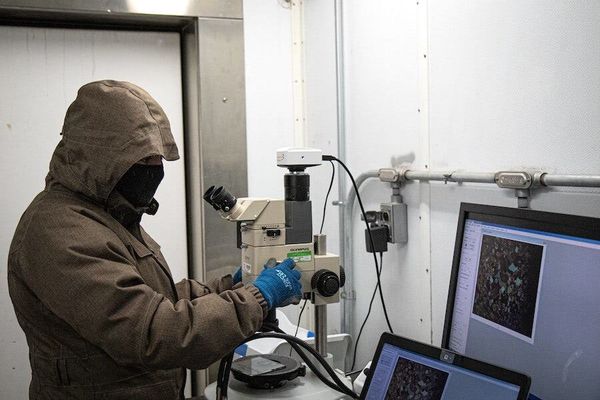- Undergraduate
Bachelor's Degrees
Bachelor of ArtsBachelor of EngineeringDual-Degree ProgramUndergraduate AdmissionsUndergraduate Experience
- Graduate
Graduate Experience
- Research
- Entrepreneurship
- Community
- About
-
Search
All Thayer News


Dartmouth interns gain research experience at ERDC's Cold Regions Research and Engineering Laboratory
Jun 09, 2022 | CRREL
Two prospective engineering majors at Dartmouth have been able to jump-start their careers through an internship program at the US Army Engineer Research and Development Center's Cold Regions Research and Engineering Laboratory (CRREL) in Hanover, New Hampshire.

Hayden Barry '25, Dr. Emily Asenath-Smith, and James Quirk '25 discuss their work in Asenath-Smith's office. (Photo by David Marquis)
Hayden Barry '25 and James Quirk '25 — through Dartmouth's First-Year Research in Engineering Experience (FYREE) program, which provides first-year undergraduate students with early hands-on experience and mentoring within engineering ― are currently working with CRREL Research Materials Engineer Dr. Emily Asenath-Smith.
"I knew I wanted to experience research, so I was really excited to take advantage of this while I have the opportunity," said Barry.
This is the first time FYREE students have been able to do research outside of Dartmouth, an arrangement that was made possible by a uniquely structured research team at CRREL. Asenath-Smith is also an adjunct assistant professor of engineering at Dartmouth's Thayer School of Engineering, and she founded and leads CRREL's Advanced Materials Team. The team is a multidisciplinary, materials science-based team, operating as a highly collaborative model, thereby providing students with a supportive research community. In research, the team is broadly focused on ice materials science, with emphases on ice adhesion, surfaces and interfaces, and ice composite engineering.
Asenath-Smith petitioned to have two interns come and work for CRREL because she feels passionately about providing students with meaningful mentorship early on in their careers.
"I received great mentorship early in my science career," said Asenath-Smith. "It really clicks with who I am as a researcher, and it increases the productivity of teams, so it is a really fulfilling arrangement for everyone involved."
The real-world research the interns are doing at CRREL is incredibly beneficial to both the student and the laboratory. Quirk says that the classroom can be very abstract but working in the lab feels as though each breakthrough has a clear connection to something tangible.
"It's very hard to imagine the tactile applications of what we're learning," said Quirk. "In my time at CRREL, I've gotten infinitely more physical experience than I have in any science class I've taken throughout high school or throughout college."
Quirk has been researching fundamental surface science and using multiple different surface characterization instruments. His research supports the broader ice adhesion program, a topic he will continue working on over the summer.
"I just never really had much experience or really many opportunities to experience applied sciences, especially coming from Arkansas. It's not as though there are a lot of windows that are open for high school students to do research, and so to be presented with this opportunity first term in college is just amazing."
James Quirk '25

Hayden Barry '25 checks the microstructure of ice samples. (Photo by David Marquis)
Barry has been a tremendous asset to the CRREL team, researching ice microstructures in CRREL's cold rooms, which are environmental chambers capable of maintaining up to minus 40 degrees Celsius and used by laboratory researchers for numerous projects.
"I prepare slides with ice specimens and study them in the microscope," said Barry. "We're looking for columnar microstructures, and we've been studying the effect of second phase materials on the microstructures."
"Hayden has totally digested the technique of ice microscopy, which requires a fine balance of art and science," said Asenath-Smith. "She really grabbed onto it, figured it out, and is doing a great job with it. Her efforts are helping us figure out why some impure ices are stronger."
"James is taking on a problem that has given us a headache for a couple of years," said Asenath-Smith. "When you study ice adhesion, it's all about coatings. There are many impressive advanced coating technologies in development and on the market. To transition these technologies to military assets, you need to be able to separate out the effect of the coating that you're interested in from any effects of the underlying substrate. James is studying the effect of different preparation methods on the properties of substrates so that we can make a recommendation to our customers on how to prepare their surfaces before applying coatings for analysis."
As this quarter at Dartmouth comes to an end, Barry and Quirk will be staying on at CRREL to continue their research, and Asenath-Smith is thrilled to keep them onboard as she says they have both grown into becoming junior experts in their research fields. She and Quirk have already created an outline of what will be a manuscript for submission to a peer-reviewed journal. She also says that Barry has a beautiful test matrix that she's working on that will easily fit into additional manuscripts being prepared by the Advanced Materials Team.
"I anticipate their contributions going directly into peer reviewed journal publications, and that the related manuscripts will get drafted this summer before they head back to the classroom," said Asenath-Smith.
"I believe in giving young students and researchers real meaningful opportunities to contribute to science and engineering. The broad application space at CRREL lends itself naturally to that — if you want to do real science, then this is the place to be. I'm super excited that Hayden and James are up for the challenge."
Dr. Emily Asenath-Smith
Overall, Barry and Quirk have had an excellent experience working for CRREL.
"It's lasting," said Quirk. "It's not just because it's the First-Year Research in Engineering Experience program — to have a chance to continue bolstering my research skills and gaining exposure to applied sciences and diverse fields has been super exciting."
For contacts and other media information visit our Media Resources page.
